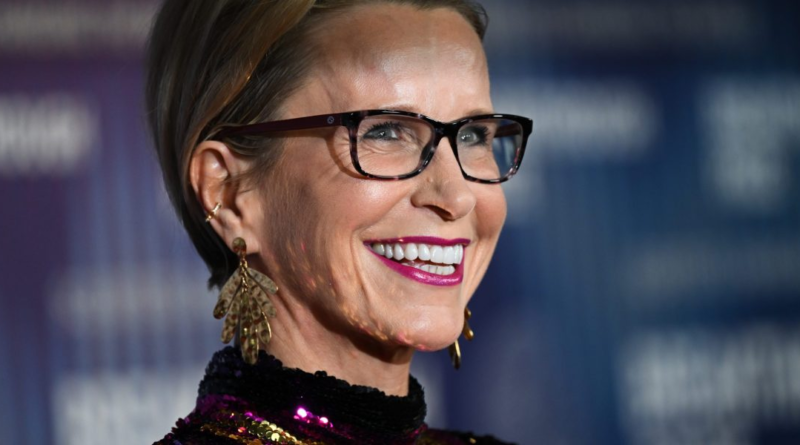How GSK CEO Emma Walmsley kept her job and turned a belligerent activist investor into an ally
When Elliott Investment Management came calling for the ouster of Emma Walmsley, the chief executive officer of GSK Plc found her remedy in a product almost 60 years in the making.
A vaccine breakthrough helped Walmsley keep her job after the hedge fund known for taking stakes in underperforming companies argued in 2021 that Britain’s oldest drugmaker had “lost its way.” Elliott’s broadsides have since then preceded the exits of at least five heads of multibillion-dollar firms, including Goodyear Tire & Rubber Co.’s Richard Kramer.
Three years later, Walmsley is still at the helm and the drugmaker is finally showing signs of improvement. The former L’Oréal SA executive also appears to have won over Elliott, whose stake is now worth 30% more thanks to a recent uplift in GSK’s share price.
Rather than go to battle, Walmsley opened the door and listened to the investor’s demands as she spun off part of the company and struck deals to refill GSK’s medicine chest. Questions remain about GSK’s ability to come up with new drugs and litigation over the antacid Zantac, and the stock still trades at a 40% discount to peer AstraZeneca Plc. But interviews with executives, shareholders and former employees paint a picture of a company that might have a shot at remaking its fortunes after turning the notorious adversary into a partner.
Walmsley was at her most vulnerable when news of Elliott’s stake emerged, four years into her tenure as chief of the UK’s second-largest pharma company. The gap between GSK and Astra remained stubbornly large. Unlike its rival, GSK had failed to develop a timely Covid-19 shot. Its share performance lagged. Walmsley, who was promoted from the consumer-health division, faced misgivings about her lack of scientific know-how. The company confronted the expiration of patents on a key medication, yet the acquisitions designed to bridge the gap were costly.
The one silver lining came from the division that had failed Walmsley during the pandemic: vaccines. The product that helped revive GSK prevents a common seasonal bug — respiratory syncytial virus, which was discovered in the 1950s. An early effort to create a vaccine backfired, and pharma companies didn’t resume research for many years. Under Walmsley’s leadership, GSK navigated eleventh-hour challenges to speed its shot to market.
Scientists embarked on a decisive clinical trial just as Elliott amassed its stake. Rival Pfizer Inc. was ahead in developing a similar shot. When GSK’s study results came in a year later, they showed almost 83% efficacy — far ahead of the 50% to 60% benchmark that’s typical for flu vaccines. The UK company won the race to market and its shot now outsells Pfizer’s in its US home market.
“We came from being two years behind to being first out the gate,” Walmsley said in an interview, in a comment that verged on triumphant for the understated executive.
The daughter of a vice admiral in Britain’s Royal Navy, Walmsley is one of just a handful of female CEOs in the male-dominated world of pharmaceuticals. Her top management team is half female – a higher proportion than at Astra, Pfizer, Johnson & Johnson and Novartis AG. Julie Brown, a former executive at Astra, joined as chief financial officer last year.
Walmsley declined to comment on her rapport with Elliott. But relations appear to have warmed since the investor called for her to reapply for her job in 2021. Walmsley and Chairman Jon Symonds are said to regularly meet with the firm’s management, including Gordon Singer, the son of the founder Paul, and portfolio manager Alex Chajecki, at GSK’s new headquarters in London’s Berkeley Square, at Elliott’s office a 15-minute walk away, or on Zoom.
Elliott hasn’t disclosed the size of its stake, making it difficult to judge the magnitude of its gains. The firm declined to comment for this article.
The challenge now for Walmsley is to keep up the drumbeat of new medicines. Results of early research don’t translate into sales for years, often decades.
One top shareholder said that while commercial execution has improved, it’s unclear whether GSK has significantly elevated its research and development processes. The investor, who declined to be identified, pointed to Astra’s steadier flow of new products.
Philip Hampton, GSK’s chairman when Walmsley became CEO, described her as a good driver of performance but expressed less certainty about her deal-making, which included the $5.1 billion takeover of US biotech Tesaro Inc. to regain a foothold in cancer.
“It remains to be seen if those deals will produce shareholder value in time,’’ Hampton said in an interview. “I think the jury’s out on the longer-term issues around transactions and the pipeline.”
GSK shares have been weighed down by concern about US litigation over whether Zantac can cause cancer — something the company denies. A sell-off in 2022 wiped out gains made since Walmsley’s arrival.
It’s taken the stock more than a year to recover, but this year it has gained 22%, surpassing Astra and Pfizer. GSK has completed its separation from the consumer-health unit, now called Haleon Plc. Sentiment is starting to shift, says Emily Field, an analyst at Barclays, in part because “RSV has been a phenomenal story.”
The vaccine business has been part of the drugmaker’s identity since at least the 1960s, when a predecessor company sold an oral polio inoculation given on sugar cubes. In a 2021 letter to Symonds and the rest of the board, Elliott described it as “one of the crown jewels’’ of the industry.
GSK’s success on RSV didn’t come easy. The shot hit a snag when GSK had to halt a trial in pregnant women, forcing it to concentrate on protecting older adults. The pandemic complicated research, as lockdowns restricted viral circulation. GSK used data modeling to predict when RSV would resurface.
With evidence that the virus would likely return shortly after restrictions eased, GSK swiftly started a final trial, six months before Pfizer. The lead allowed it to be the first to win US regulatory approval in early May 2023 .
Then began a battle to secure sales, which Christi Kelsey, head of commercialization for GSK’s vaccines, described as “hand-to-hand combat, so to speak, with a very formidable competitor.” GSK pulled off another coup by becoming the only supplier for the elderly to largest US pharmacy chain, CVS Health Corp., helping it scoop up two-thirds of the market share .
Walmsley replaced 100 of GSK’s 125 top managers in her first years at the helm. Chief Commercial Officer Luke Miels, poached from Astra shortly after Walmsley became CEO in 2017, gets credited for much of GSK’s recent commercial successes. Miels is sometimes also cited as her potential successor.
Chief Scientific Officer Tony Wood, who joined from Pfizer in 2017, says that when he arrived GSK was rooted in its past, focused on respiratory drugs and medicines such as beta blockers to lower blood pressure. While Astra spent more than 25% of its sales on research and development, GSK’s share was a meager 14%. GSK is better now at prioritizing funding for promising projects, according to Wood.
Walmsley’s efforts ruffled feathers, and morale was initially low at GSK’s research hub in Stevenage, north of London. In an early gaffe that upset some scientists, Walmsley said she would prevent them from wasting time on pet projects that had little commercial potential.
Paul Peter Tak, a former chief immunology officer and global development lead at GSK, was among those who felt the shift under Walmsley’s leadership. Tak, who left in 2018 and is now CEO of Candel Therapeutics Inc., chooses his words carefully when assessing his former employer’s performance in early drug discovery — a key benchmark for drugmakers, which otherwise have to buy experimental medicines to make up for their own labs’ shortages.
“It’s important to foster a culture of creativity and transformative innovation, and to get the balance right between freedom and accountability,’’ he said in an interview. “Many large pharma companies, including GSK, have struggled. That’s why productivity in biotech is on average higher in discovery of new medicines.”
At GSK’s Stevenage research hub, scientists have embraced AI, machine-learning and functional genomics to try to improve the success rates of clinical trials. They are working on experimental treatments for chronic hepatitis B infection and a vaccine against gonorrhea.
The initial signs are that Walmsley pulled off an unlikely victory.
When she spoke after the company’s latest earnings report in May, GSK had just boosted its full-year guidance, capping a quarter that surpassed estimates. Four analysts had upgraded their outlook for the company since January.
Walmsley insists she is unbothered by the pressure from Elliott and questions over her ability as a CEO. Part of the CEO’s job, she says, is to have the “courage of your convictions.”




